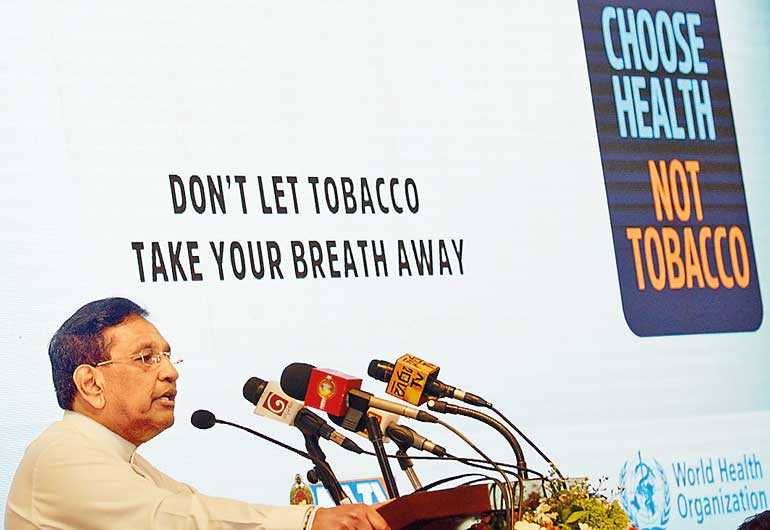Tuesday Feb 17, 2026
Tuesday Feb 17, 2026
Tuesday, 18 June 2019 00:13 - - {{hitsCtrl.values.hits}}

As long as he is the Health Minister, Dr. Rajitha Senaratne stated yesterday that he will not allow the import of foreign cigarette imports into the country.
The Minister was speaking at an event to commemorate World No Tobacco Day 2019 held in Colombo yesterday, organised by the Ministry, the National Authority on Tobacco and Alcohol (NATA) and the World Health Organization.
Minister Senaratne’s statement comes after Finance Minister Mangala Samaraweera announced two weeks ago that the Government was considering allowing cigarette imports, in order to meet demands of expatriate – especially Chinese – workers in the country.
The Health Minister added that he will work to ensure no foreign cigarettes are allowed into the country, whilst also moving to stop local production of cigarettes.
Senaratne added that allowing imports for the benefit of one expatriate community would serve as a precursor to enabling imports from other countries, which would undermine and destabilise the efforts taken to control cigarette smoking in the country, and such a situation must be avoided at all costs.
The Health Minister’s comments were echoed by NATA Chairman Dr. Palitha Abeykoon, who added that any plan to import cigarettes goes against the tobacco control policy of the Government, and that all efforts will be taken to prevent this from happening. He underscored the need to introduced plain packaging for cigarettes in Sri Lanka to minimise visibility to younger generations and attraction, whilst also moving swiftly to ban the sale of single sticks.
Abeykoon also touched on electronic cigarettes which are growing in popularity in developed markets, stating that whilst some products have been slated as reduced harm products or positive alternates, his agency was looking at preventing them from proliferating in Sri Lanka and studying a possible ban.
The WHO and the UNDP praised efforts taken by Sri Lankan governments in the sphere of tobacco control, and identified the country as a leading nation in the effort to ban tobacco use. Discussions were also held at the forum on banning the cultivation of tobacco and providing viable alternates to tobacco farmers in the country.
They added that tobacco is a development issue and has a negative impact on all indices and achieving Millennium Development Goals. They also suggested introducing licenses to tobacco retailers.